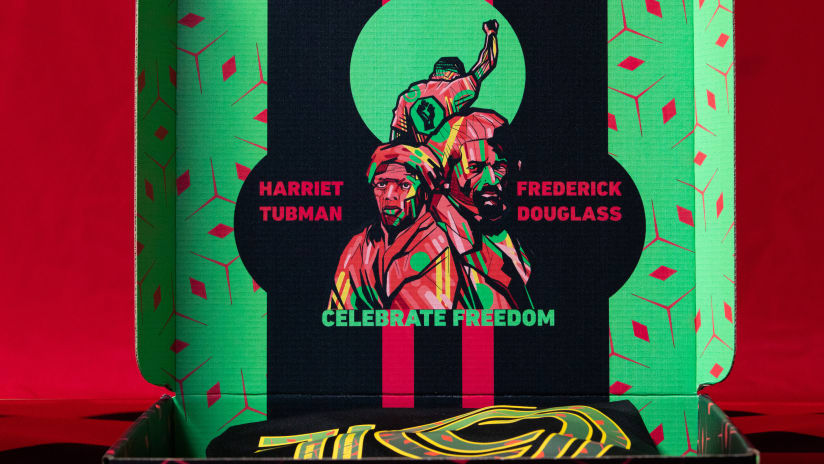This weekend, art and sport will combine to celebrate, educate and pay forward as MLS recognizes Juneteenth.
Today, Juneteenth will likely be signed into law as the 12th official federal holiday. However, Juneteenth has been celebrated in some form since June 19, 1866, one year to the day from when enslaved people in Galveston, Texas, were informed by Union troops of the Emancipation Proclamation signed in 1862. The declaration of what was known as General Order No. 3 in Texas on June 19, 1865, marked the end of slavery in Confederate states. The annual celebrations on June 19th eventually became Juneteenth.
With Juneteenth falling on a match weekend this year, MLS and Black Players for Change have collaborated with Indianapolis-based artist Israel Solomon to celebrate the holiday within the games themselves. When MLS players take the field this weekend, they’ll play with specially designed numbers on their backs. Those jerseys are accompanied by a Solomon-created limited-edition box that will be auctioned off post-match. The proceeds from those auctions will go to local Black charities and organizations selected with input from members of Black Players for Change.
Solomon began working on the design for the box and numbers when recently-retired Philadelphia Union legend, fellow Indianapolis native and Black Players for Change board member Ray Gaddis reached out to ask if Solomon could join the project. Solomon began talking with BPC members and researching Juneteenth artwork.
The artwork he found regularly featured red, black and green with yellow lettering. It made sense that the numbers and box would too. The colors represent that connection to the artistic history of Juneteenth, but they also coincide with the red, black and green Pan-African flag. Red for the blood shed in the fight for liberation. Black for the culture and people the flag represents. And green for growth.
In addition to red, black and green, the box features information about Juneteenth, images and quotes of the abolitionists and freedom fighters Harriet Tubman and Frederick Douglas. It also features a member of Black Players for Change standing tall in a demonstration that its members can stand tall because they stand on the shoulders of those who came before them. And it all comes from a collaborative effort between Solomon, BPC and MLS.
“One thing that I noticed very quickly was that the individuals that I spoke with in MLS and in Black Players for Change were very intentional. I knew that what we wanted was something with a message. And I knew that this wasn't something for filler because everyone who I spoke with was passionate and authentic,” Solomon said.
“I feel that this was a collaborative effort. This was not just something that came from my mind. What came from it was a very impactful piece that I think will attract many and will also be a piece that can educate individuals who obtained the jersey in the box as well.”

One of the BPC members Solomon collaborated with is longtime MLS forward and BPC’s Director of Strategic Partnerships, Quincy Amarikwa. Amarikwa talked with Solomon about the idea of “ownership.” It resonated with Solomon and found its way onto the box in the form of a message that can be carried beyond Juneteenth: Own your voice.
“Owning your voice is something that resonates on every level with regard to personal responsibility, as well as a sense of purpose and legacy that you can own and pass down to future generations when you preach and push for the idea and concept of ownership,” Amarikwa said.
“I think until we created the BPC organization we hadn't had a platform and a line of communication to be heard. It’s something that I believe we own. We built it, we own it and it allows us to continue to own our narrative. And that is a singular message that I think is important to continue to promote because it addresses a lot of the issues that I think many of us experience along the way. Owning something means personal responsibility. It means maintaining it. It means investing in the now, but also being mindful of the future and being a good steward of your position and your platform and your influence.”
This weekend, the league as a whole is working to act as a good steward. However, there is recognition that there is work to do well past one weekend. The hope is that a weekend incorporating celebrations of Juneteenth across MLS will provide action and education that will create a feedback loop of action and education that coincides with the movements and discussions happening around the country.
“Action begets action. This is one thing that we're doing and now we'll continue on to the other,” MLS' Chief of Diversity, Equity & Inclusion, Sola Winley, said. “I think if you took a poll of people who had any notion of what Juneteenth was 12 months ago I think the numbers would be, would be very low, particularly outside of the Black community. So my hope is that it continues to be a moment in time where schools all over the country will talk about it. Where there will be more education and awareness around it. That this is a significant moment in American history. Not just in Black history. In American history.”
Art and sport are intersecting this weekend along with history and a hope that learning from it will lead to a better future. It’s a small step. But If this weekend encourages others to move forward, then those involved say they’ll see it as a success, especially if that step forward comes with an understanding that there are many more steps to go.
“I think anything great, it starts with the first step. It’s a small step in the short term, but I believe over the next three, five, 10 years, it will be reflected upon as a historic moment in soccer history,” Amarikwa said. “Not just US soccer history, but just soccer history. This isn't something that's ever been recognized. Something that's ever been celebrated and been valued.
“For me, the takeaway is understanding that everyone is valuable. Everyone is necessary. And we're all in this together. Whether we love that, or not, that's just a fact. And I think the common truth is we would all like to have opportunities for ourselves and our family. We'd all like to feel safe. We'd all like to feel valued. We'd all like to feel there's upward mobility. That the future is better and is brighter. I think those are all common needs, wants, hopes that we have as humans.
“And hopefully, we can look to moments like this as reminders of when we forget that we're all in this together and that we are all humans. Atrocities can happen, things that we aren't proud of about our history, things that we would like to ignore or forget, but doing so is what allows those things to happen. That's what I hope to take away from it. Self-reflection and maybe being open to learning a little bit more about something you might not have been aware of or been open to before the day.”













